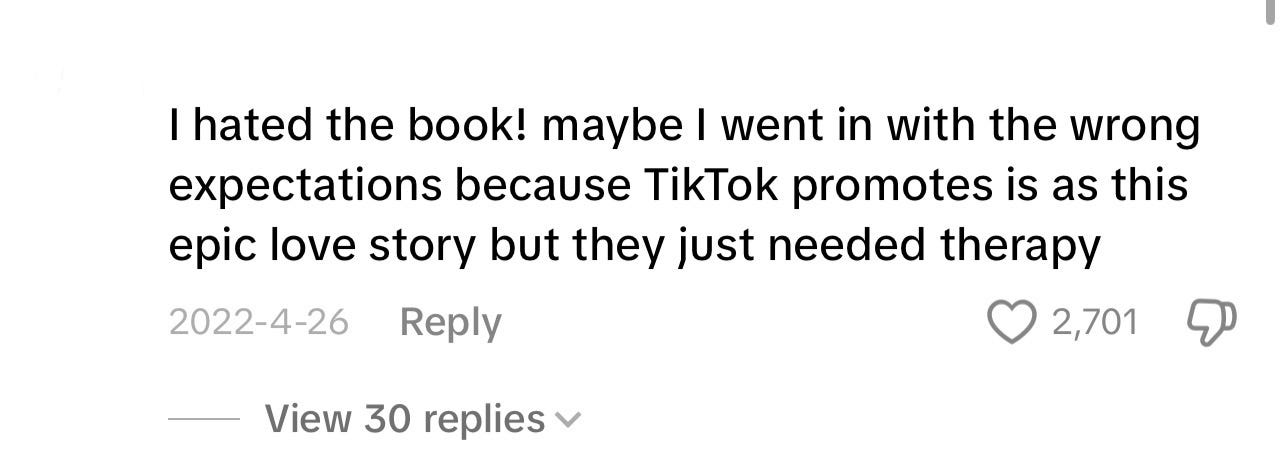you're reading sally rooney wrong
on the importance of cultural context in ‘normal people’ & the 'go to therapy' argument
TW: this post contains discussions of mental illness, depression, anxiety & suicide.
Like millions of others across the world, I spent the spring of 2020 lockdown watching Normal People.
Based on the 2018 novel by Irish author Sally Rooney, the TV series Normal People was released in the UK on 26 April 2020, and 3 days later in the US on 29 April 2020. The show dropped to much fanfare, dominating social media feeds for the few hours/days it took people to binge watch it, and discussions of the show lasted for months. After all, we were all stuck at home, what else did we have to do?
Normal People became the most-streamed series of the year on the BBC. It received widespread critical acclaim, was Emmy-nominated, and won a number of television awards, taking home 9 out of the 15 awards it was nominated for at the 2021 Irish Film & Television Awards. To say people became obsessed with this show would be putting it lightly. Remember the Instagram account @connellschain, a page dedicated to the chain necklace that Connell (played by Paul Mescal) wears in the show? Lockdown really did a number on us.
Before the release of her 2018 novel Normal People, Sally Rooney had already enjoyed a fair amount of success. Before even publishing a novel, Rooney had been submitting poems and essays to Irish literary magazine The Stinging Fly, her work eventually capturing the attention of an agent.
The manuscript for what would become her debut novel, Conversations with Friends, went through a seven-way auction for its publishing rights. Conversations with Friends was published in 2017 to positive critical reception, and was nominated for a few literary prizes. But the popularity of her next novel Normal People, and its subsequent TV adaptation, is what really launched Sally Rooney into the literary zeitgeist.

Normal People sold millions of copies, was longlisted for the 2018 Booker Prize, and won a string of other prestigious awards. The success of the TV series in 2020 generated a €8 million+ boost in book sales for Sally Rooney in Ireland and the UK, and catapulted the novel to the top of bestseller lists 2 years after its publication. Needless to say, Normal People is one of the most popular and successful novels that’s been released in the last few years.
At the height of the novel’s popularity, and still often today, one of the most frequent criticisms levelled against Normal People is the assertion that "these characters just need to go to therapy." If you scroll through the lower ratings of the book on Goodreads, variations of this argument crop up in the reviews. Not to mention the numerous Instagram posts, Tweets, and TikTok videos where people say the same thing.
Of course, people are allowed to dislike a book. I dislike many books that I’ve read. But disliking a book without taking the time to understand it is where the issue begins to arise. The prevalence of these shallow takes feed into the ongoing wider anti-intellectualism debates that have been rife on social media recently, although I don’t want to dig into all of that here. However, this troubling decline in critical reading leads to many surface-level interpretations of texts that actually have significant depth.
When engaging with Normal People through what I’ll call the 'go to therapy argument’, the distinctly Irish cultural context of the novel is being cast aside. But like with any media form, it cannot be separated from the context in which it was created (ahem ‘you think you just fell out of a coconut tree?’)
Along with exploring the relationship between its two protagonists, Connell and Marianne, Normal People is largely a novel about mental illness, and it is Irish. These are two facts that are inextricably linked; you cannot discuss or analyse one without considering the other. The novel’s depiction of mental illness cannot be divorced from its cultural setting of modern Ireland, where the historical influence of Catholicism has profoundly shaped societal attitudes toward mental health.
Teachings from the Catholic Church seeped into the cultural fabric of Ireland and have shaped many of its societal norms and cultural attitudes, many of which still prevail today. Within the context of a society that valued tradition and conservatism, mental health became a taboo subject that was not to be acknowledged or discussed openly. This left behind a cultural tendency toward emotional stoicism, where personal struggles are repressed and your emotions are not a topic of discussion. If your emotional struggles were uttered aloud, they were strictly confined to the confessional booth at church. As comedian John Mulaney once joked: “The plan with Irish people is like, "I'll keep all my emotions right here...and then one day I'll die.”.
This Irish attitude towards shunning mental illness is perfectly illustrated by the proliferation of asylums in Ireland throughout the 19th century. Over two dozen asylums were built in Ireland during the 1800s, which maintained consistent populations across the decades. At one point in 1956, 20,063 people were in public mental health hospitals in Ireland. This tradition of viewing mental illness as something to be hidden and down-played has contributed to the cultures of silence which still influence Irish cultural attitudes towards mental health today.
Social class is also a prominent theme in the novel Normal People, a factor that is intrinsically linked to mental health. Research has shown that young people in the lowest income bracket are 4.5 times more likely to experience a severe mental health problem than those in higher. A suicide epidemic in Ireland has been a cause for concern for many years now, particularly among men who have a suicide rate which is 5 times higher than their female counterparts (NSRF 2016), a number which rises in its working class population.
The long waiting lists for counselling in public health services and the high costs of private therapy only work to further exacerbate the problem, leaving people to feel as though they have no other option or way out. Due to this, those in the UK and Ireland tend to view therapy as a luxury afforded to the rich who have the disposable income to supplement it. The fact that Connell, who grew up working class, only gains access to counselling in a university setting isn’t coincidental. The fact that he is quickly given an appointment for a university counselling service in lieu of being placed on a months long waiting list is nothing short of miraculous, but that’s another topic entirely.
The counselling sessions that Connell eventually attends in the novel offer a clear picture into how these Irish cultural attitudes of mental health have manifested in a young man.
Throughout the novel, Connell consistently minimises his personal struggles and depression, which deteriorates further after one of his hometown friends commits suicide, providing yet another example of the mental health crisis among Irish men. Despite having major panic attacks and severe anxiety, the above interaction demonstrates how Connell has been socialised to be cavalier when discussing his mental health.
In a scene where Yvonne, one of the counsellors provided by the university, asks Connell to talk about how he’s been feeling, he replies ‘yeah, not great’. His casual responses are indicative of the tendency to down-play his struggles and remain stoic about his mental health issues, despite the fact that his score on the Becks Depression Inventory questionnaire suggests he is experiencing very severe depression.
It is clear throughout Connell’s experience with the counselling service that the whole situation is rather alien to him, reflective of the general skepticism towards mental health, and particularly seeking help for it, in the culture he’s grown up in. Going to therapy or ‘having a therapist’ in countries like Ireland and the UK is fairly unusual, especially if you’re working class.
Therefore, approaching Normal People with the 'go to therapy argument’ reflects a distinctly American-centric perspective, where going to therapy is much more widely accepted and normalised. When scrolling through any social media platform on an average day, it’s guaranteed I will see some kind of American advert promoting therapy or some kind of mental health support programme. If I consider the influencers and YouTubers I follow on social media, a large proportion of the American ones attend therapy or have in the past, and are comfortable to discuss that openly in their content.
But when it comes to those outside the US, especially British or Irish influencers, that number reduces significantly. The ones that do attend therapy and make references to their therapist are usually from middle or upper class backgrounds, or are those who have attained higher socioeconomic status through their online success, which has in turn made therapy a more accessible option.
Reducing the struggles and miscommunication of the characters in Normal People to a simple solution like “they just need to go to therapy" overlooks the deeper cultural attitudes and historical context at play in the novel. The explorations of mental health, social class, and how the characters navigate their relationships in Normal People can truly only be understood within this broader cultural context. Without it, much of the novel’s depth, nuance, and brilliance is lost.







you hit the spot with this one! Rooney’s works are meant to be read critically for the full impact. Her books have minimal plot and are more about societal observations. And at the core of Rooney’s work is her critique of social class as pointed out. I think the problem is that a lot of people who pick her novels up because they are cool or popular don’t have experience of a working class background or at least read through that critical lens. Rooney’s works are not meant to be enjoyable, they’re meant to be enlightening. To not enjoy the novel because it’s not like the series just emphasises this class divide because not being middle class if difficult and not fun! Thank you for writing this 💛
i love this leah!! i think the distinction of normal people as an irish novel is sooooo important and since so many people discovered NP from tiktok or romance recs, it's crazy how quickly the irish context is swept under the rug! i'm so glad you wrote this!